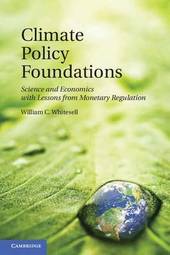
|
Climate Policy Foundations: Science and Economics with Lessons from Monetary Regulation
Paperback / softback
Main Details
| Title |
Climate Policy Foundations: Science and Economics with Lessons from Monetary Regulation
|
| Authors and Contributors |
By (author) William C. Whitesell
|
| Physical Properties |
| Format:Paperback / softback | | Pages:256 | | Dimensions(mm): Height 229,Width 152 |
|
| Category/Genre | Environmental economics
Political economy
Global warming
Environmental science, engineering and technology |
|---|
| ISBN/Barcode |
9781107614727
|
| Classifications | Dewey:363.73874 |
|---|
| Audience | | Professional & Vocational | |
|---|
| Illustrations |
Worked examples or Exercises
|
|
Publishing Details |
| Publisher |
Cambridge University Press
|
| Imprint |
Cambridge University Press
|
| Publication Date |
27 August 2012 |
| Publication Country |
United Kingdom
|
Description
This book provides a thorough grounding in the science and economics of climate policy issues and draws key lessons from the longer experiences of central banks in grappling with related challenges. Findings and controversies of climate history and the effects of human activities on climate are reviewed. The author describes similarities in risk management approaches for climate and monetary policy. Overall goals and frameworks for addressing climate change risks are assessed. Command-and-control and market-based options are compared (including performance standards, taxes and cap-and-trade). Market-based approaches sometimes require a choice between prices and quantities as policy instruments. However, the author discusses how techniques of central bank interest rate management can be adapted in a hybrid climate policy approach to achieve environmental goals while making carbon prices predictable and also ensuring well-functioning carbon markets. Key lessons are offered for improving existing and future national and international climate policy architectures.
Author Biography
William C. Whitesell is Director of Policy Research in Washington, DC. From 1987 to 2006 he served on the staff of the U.S. Federal Reserve Board, where he held management responsibilities for staff work on the formulation and implementation of monetary policy, including market analysis and the monetary regulation of banks. He conducted independent climate economics research from 2006 to 2007. Dr Whitesell has also held positions as a financial analyst at the World Bank and as a development finance specialist at the Banque Arabe et Internationale d'Investissement, in addition to proprietary consulting. Earlier he taught economics at New York University and Virginia Tech. He holds an MBA from the Wharton School at the University of Pennsylvania and a Ph.D. in economics from New York University.
ReviewsReviews of the hardback: 'In Climate Policy Foundations, William Whitesell has done an excellent job not only in providing systematic introductions to both the science and the policy of climate change but in integrating the two as well.' J. Samuel Barkin, Review of Policy 'Those put off by climate hysteria will find in this book a calm and reasoned discussion that succeeds in pointing out both the unprecedented position in which humans find themselves from a geological perspective and their demonstrated ability to deal satisfactorily with problems of similar complexity through monetary policy.' A. Denny Ellerman, European University Institute and Massachusetts Institute of Technology 'Whitesell's book is a tour de force. He gives us a unique combination of climate history, climate science, and economic insight. It is a perfect foundation for discussing policy.' E. Donald Elliott, Yale Law School, and former General Counsel, US Environmental Protection Agency 'A volume that not only does a very good job of summarizing in one place the science and economics of climate change but that also provides valuable lessons for policy design.' Juan-Pablo Montero, Pontificia Universidad Catolica de Chile 'Whitesell's book should be a must-read for anybody attempting to tackle the challenge of our warming Earth. Rather than presenting the black-or-white, all-or-nothing picture that so often characterizes our political debate, Whitesell provides the reader with the shades of gray that truly dominate the debate, and provides a sense of the risk management decisions necessary to attack the resulting uncertainty. May our leaders find a way to bring as sophisticated an approach to the great challenge of climate change!' Timothy Profeta, Duke University
|